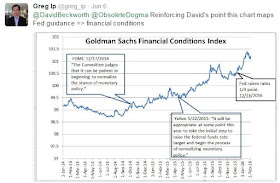Scott Sumner is right. Brexit is the biggest global monetary shock since 2008. This could be the tipping point that turns the existing global slowdown of 2016 into a global recession. Here is why.
First, Brexit is adding further strength to an already overvalued dollar. The trade weighted dollar had appreciated roughly 25 percent between mid-2015 and early-2016. That is a very sharp increase in so short a time. It has come down some, but not much as seen in the figure below (red line):
The figure also shows that this sudden increase in the dollar is closely tied to the policy divergence between the Fed and the ECB (blue line). That is, as the Fed began
talking up interest rate hikes in mid-2014 the ECB was talking up the easing of monetary policy. The rise in the blue line shows this policy divergence
1
Brexit is now adding fuel to this dollar fire. The dollar has appreciated almost 4 percent since the Brexit fate became clear last evening, as seen in the figure below.
Why does a strengthening dollar matter? There are two reasons. First, over 40 percent of the world economy ties its currency to the dollar in some form. This can be seen in the figure below. That means when the dollar strengthens, these currencies strengthen too. This is the curse of the so called 'dollar block' countries--they import their monetary policy from abroad. Via this channel, Brexit has just further tightened monetary conditions in all these countries. This added pressure makes it likely
China will be forced to devalue soon. And we saw how well that went last time it was tried.

The second reason the rising dollar matters is the rapid growth of what the
BIS calls the 'parallel dollar system'. This is a system of dollar loans and dollar debt securities that has emerged outside the United States. This dollar credit to and from non-U.S. residents has tripled since 2000, while non-resident Euro and Yen financing has remained relatively stable. In fact, the dollar's share of this non-resident credit growth has increased from 62% to 75% according to BIS data. This means there is a lot of dollar-denominated debt outside the United States that is very vulnerable to dollar shocks. Brexit just increased the real debt burden of these borrowers.

So between tightening monetary conditions for the dollar bloc countries and increasing real debt burdens for all the non-resident issuers of dollar debt, the global economy has been hit with a large dollar shock. Put more crudely, the strong dollar noose that has been choking emerging economies since mid-2014 has now been complemented by the opening of trap door on the gallows via Brexit. This makes the strangulation of global economy complete.
A second reason Brexit might be pushing the global economy into a global recession is that it hastening the the frantic race to bottom on safe yields. As I noted in a
recent post, yields on safe assets around the world have been going down since the demand for safe assets remain unmet. Given global capital markets this also means there is a race to the bottom on safe yields as noted by
Caballero, Fahri, and Gourinchas (2016) :
In the open economy, the scarcity of safe assets spreads from one country to the other via the capital account. Net safe asset producers export these assets to net safe asset absorbers until interest rates are equalized across countries. As the global scarcity of safe assets intensifies, interest rates drop and capital flows increase to restore equilibrium in global and local safe asset markets. Once the ZLB is reached, output becomes the adjustment variable again.
Brexit massively intensified this race to the bottom as seen in the the 10-year yield below. Incredibly, the yield fell from 1.74 to 1.43 this evening! Brexit, in other words, just jolted the demand for safe, liquid assets in a major way.
This frantic race to the bottom of safe yields will eventually run up against the effective lower bound (ELB). When that happens something else will have to adjust. And that something is output, as noted by
Caballero, Fahri, and Gourinchas (2016)
So there you have it. The world has been hit with a massive global monetary shock. And via dollar bloc countries, the parallel dollar system, and the shortage of safe asset problem this monetary shock may be what pushes an already slowing global economy into a global recession.
Will central bankers and finance ministries be ready for it? I hope so.
Update: For some soul searching on the why of Brexit, see my
previous post.
1The blue line shows the spread between the 1-year US treasury rate and the 1-year Euro rate. Based on the expectation hypothesis, the 1-year interest rate approximately equals the expected average of short-term interest rates over the same horizon. Consequently, if 1-year rates are going up it implies short-term rates are expected to rise on average over the next year. The spread between the treasury and euro rates, then, reveals the expected divergence between the expected path of policy interest rates over the next year.

















